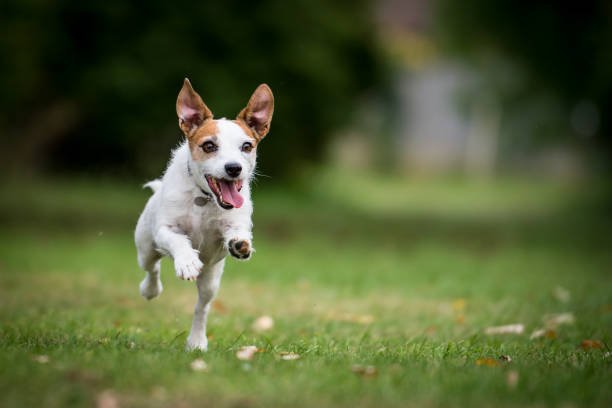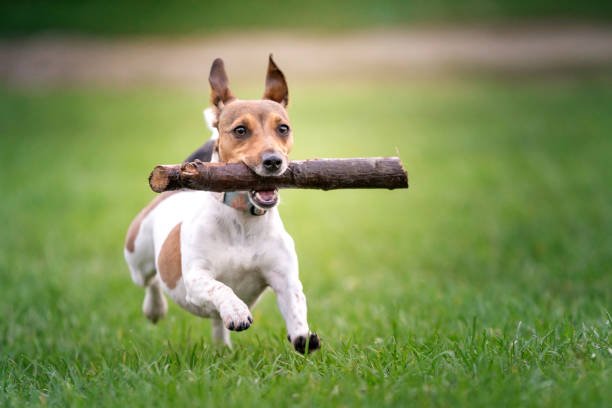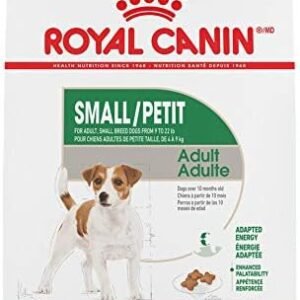Jack Russell Terriers, often lovingly referred to as “JRTs,” are a lively and spirited breed that has captured the hearts of dog enthusiasts worldwide. In this comprehensive guide, we have delved into the world of Jack Russell Terriers, exploring their unique qualities, their suitability for active families, and why selecting the right breed is crucial when considering them as your canine companion.

Jack Russell Terrier Breed Information
Before we delve into specific aspects of Jack Russell Terriers, let’s start by summarizing key breed information in a handy table. This quick reference provides an overview of their essential characteristics:
| Field | Information |
|---|---|
| Height | 10 to 12 inches (at the shoulder) |
| Weight | 13 to 17 pounds |
| Life Span | 13 to 16 years (on average) |
| Good with | Active families, experienced dog owners |
| Temperament | Intelligent, energetic, fearless |
| Intelligence | Very high |
| Shedding Amount | Low |
| Grooming | Low maintenance |
| Exercise Needs | Very high |
| Energy Level | Off the charts |
| Barking Level | Moderate |
| Drool Amount | Minimal |
| Coat Length/Texture | Smooth and dense |
| Colors | Predominantly white with tan, black, or brown markings |
| Patterns | Spots, patches, or ticking |
This table serves as a quick reference to key characteristics of the Jack Russell Terrier breed. Now, let’s delve into the breed’s history and origin.
Breed History and Origin
Tracing Their Origins
To fully comprehend the Jack Russell Terrier breed, it’s essential to journey back in time and explore their intriguing history and origin. Jack Russell Terriers are a distinct terrier breed with a remarkable lineage that has influenced their spirited nature.
The history of the Jack Russell Terrier is closely tied to the Reverend John “Jack” Russell, an English clergyman with a passion for fox hunting. He is credited with developing the breed in the early 19th century.
Key Historical Milestones
Reverend John Russell: The breed’s namesake, Reverend John Russell, was an avid fox hunter who wanted a small, fearless, and agile terrier for fox hunting. He began breeding dogs that possessed these qualities.
Development as a Working Terrier: Jack Russell Terriers were bred to be working dogs used in fox hunts. They needed to have the energy, fearlessness, and intelligence to track and bolt foxes from their dens.
Selective Breeding: Reverend Russell was selective in his breeding practices, emphasizing specific traits. This selective breeding laid the foundation for the modern Jack Russell Terrier.
- Recognition as a Breed: Over time, Jack Russell Terriers gained recognition as a distinct breed, known for their unique qualities. They are often distinguished from other terrier breeds by their characteristics.
Influence on Modern Traits
The historical legacy of the Jack Russell Terrier is profoundly ingrained in their character today. The breed was crafted for specific purposes, and these purposes have left a significant mark on their behavior and temperament.
Fearlessness and Tenacity: Their fearless nature and unwavering tenacity were essential for flushing foxes from their dens during hunts. This fearlessness is a defining trait of the breed.
High Energy Levels: Jack Russell Terriers were bred to be energetic and agile, capable of keeping up with the fast-paced fox hunting. Their boundless energy remains a characteristic feature.
Intelligence and Problem-Solving: Fox hunting often required the dogs to navigate complex underground dens. Consequently, Jack Russell Terriers are highly intelligent and excel in problem-solving.
Strong Bonds with Owners: These terriers form strong bonds with their owners. Their close connection with humans is a testament to their history as hunting companions.
The historical context is pivotal in understanding the spirited and energetic nature of the Jack Russell Terrier. It explains their fearlessness, energy, and intelligence, which continue to define the breed today.
Understanding Jack Russell Terrier Traits
Jack Russell Terriers are known for their distinctive traits, both in terms of physical characteristics and temperament. Understanding these traits is essential when considering a Jack Russell Terrier as a potential addition to your family.
Physical Characteristics
The physical attributes of Jack Russell Terriers are a testament to their agility and suitability for hunting.
Size: Jack Russell Terriers are small dogs, standing approximately 10 to 12 inches at the shoulder. This compact size allows them to navigate fox dens and tight spaces effectively.
Exercise and Activity Recommendations
Jack Russell Terriers are renowned for their incredible energy levels and boundless enthusiasm. Their history as working terriers and hunting companions has wired them for constant activity. To keep your Jack Russell Terrier happy, healthy, and well-behaved, you’ll need to meet their exercise needs effectively. Here’s a detailed exercise plan, including the types of exercise, duration, and frequency for this high-energy breed.

Types of Exercise
Playtime: Engage in interactive play sessions with your Jack Russell Terrier. They love games like fetch, tug-of-war, and hide-and-seek. These activities stimulate their minds and provide physical exercise.
Walks: Regular walks are essential to meet your Jack Russell’s exercise needs. Daily walks are recommended, and they should be brisk and interactive. Jack Russells love to explore, so give them opportunities to sniff and investigate their surroundings.
Agility Training: Jack Russell Terriers excel in agility courses. These activities challenge their intelligence and physical abilities. Consider enrolling your dog in agility classes or setting up agility equipment in your backyard.
Running and Jogging: If you’re a jogger or runner, your Jack Russell Terrier can be an excellent running partner. They can keep up with your pace and enjoy the extra challenge.
Mental Stimulation: Don’t forget the importance of mental exercise. Puzzle toys, treat-dispensing toys, and training sessions provide the mental stimulation these intelligent dogs crave.
Socialization: Regularly socialize your Jack Russell Terrier with other dogs. Socialization not only provides exercise but also helps them develop good social behavior.
Duration and Frequency
To keep your Jack Russell Terrier content and well-exercised, consider the following exercise recommendations:
Playtime: Engage in 20 to 30-minute play sessions daily. These can be broken into shorter sessions throughout the day.
Walks: Aim for at least 1 to 2 hours of walking per day. This can be divided into multiple walks to prevent boredom.
Agility Training: Schedule agility training sessions 2 to 3 times a week. Each session can last 20 to 30 minutes.
Running and Jogging: If you’re jogging, aim for a 30-minute jog at least 3 times a week. Adjust the duration based on your dog’s fitness level.
Mental Stimulation: Provide mental exercise daily. Short training sessions or puzzle toys can keep their minds active.
Socialization: Encourage socialization with other dogs during playdates or trips to the dog park. This can be a weekly or bi-weekly activity.
Additional Considerations
When exercising your Jack Russell Terrier, consider the following additional points:
Variety: Mix up their exercise routine to prevent boredom. Variety keeps their minds engaged and ensures they don’t become too fixated on a single activity.
Weather: Take weather conditions into account. Jack Russells tolerate a range of climates, but extreme cold or heat may require adjustments in exercise duration and timing.
Supervision: Keep your dog on a leash during walks and in unfenced areas. Their prey drive can lead them to chase smaller animals.
Safety: Ensure your dog’s safety during activities like agility training. Proper equipment and supervision are essential to prevent accidents.
Progression: As your Jack Russell Terrier builds stamina and strength, you can gradually increase the intensity and duration of their exercises.
Remember that a tired Jack Russell Terrier is a well-behaved one. Failing to provide adequate exercise and stimulation can lead to boredom and potentially destructive behavior. By following this exercise plan, you’ll help your Jack Russell stay happy, healthy, and content.
Nutrition and Feeding Guidelines
Proper nutrition is essential to keep your Jack Russell Terrier healthy and full of energy. Their small size and high activity level mean they have specific dietary needs. Here are some guidelines for feeding your Jack Russell Terrier:
Choose High-Quality Dog Food: Start by selecting a high-quality commercial dog food. Look for options specifically designed for small or active breeds. These formulas are typically well-balanced to meet the needs of a Jack Russell Terrier.
Consider Their Age: Your Jack Russell’s age matters when determining their diet. Puppies, adults, and seniors have different nutritional requirements. Choose food that corresponds to their life stage.
Portion Control: Be mindful of portion control. Overfeeding can lead to weight gain, which is a concern for this breed. Follow the feeding guidelines provided on the dog food packaging, and adjust portions based on your dog’s activity level and metabolism.
Avoid Overfeeding: Jack Russell Terriers are known for their love of food, so it’s important to avoid overindulgence. If you’re using treats for training, be sure to adjust their main meals accordingly to prevent excessive calorie intake.
Regular Feeding Schedule: Stick to a consistent feeding schedule. Feeding your Jack Russell at the same times each day helps regulate their metabolism and bathroom habits.
Provide Fresh Water: Always ensure that fresh, clean water is available to your dog. Hydration is vital, especially for active dogs like Jack Russell Terriers.
Avoid Toxic Foods: Some human foods can be toxic to dogs. Keep your Jack Russell Terrier safe by avoiding items like chocolate, grapes, onions, and foods with high salt content.
Monitor Allergies: Pay attention to any food allergies your Jack Russell Terrier might have. Common allergens include grains and certain proteins. If you suspect allergies, consult with your veterinarian to determine the best diet for your dog.
Regular Vet Check-Ups: Your veterinarian can offer guidance on your dog’s specific dietary needs. Regular check-ups can help catch and address any nutritional concerns.
- Consider Supplements: In consultation with your vet, you may need to provide supplements, such as omega-3 fatty acids, to support your Jack Russell Terrier’s coat and skin health.
Remember, each dog is an individual, and their nutritional needs can vary. It’s essential to monitor your Jack Russell Terrier’s weight and adjust their diet accordingly to maintain a healthy body condition. Consulting with your veterinarian is always a good idea to ensure you’re providing the best nutrition for your furry friend.
Exercise Requirements
Jack Russell Terriers are renowned for their high energy levels and need for exercise. Failing to provide them with enough physical activity can lead to behavioral issues and unhappiness. Here’s what you need to know about their exercise requirements:

Daily Exercise: Jack Russell Terriers need daily exercise to stay happy and healthy. Aim for at least 30 to 60 minutes of physical activity every day. This can include walks, playtime, and interactive games.
Mental Stimulation: Inaddition to physical exercise, mental stimulation is crucial. Jack Russell Terriers are highly intelligent and need mental challenges to prevent boredom. Puzzle toys, obedience training, and agility courses are excellent options.
Off-Leash Play: These dogs thrive when they have a chance to run and play off-leash. If you have a securely fenced yard, this can be an ideal way for them to burn off energy.
Socialization: Socialize your Jack Russell Terrier from a young age. It helps them get along with other dogs and prevents aggressive behavior.
Chasing and Fetch: Jack Russell Terriers have a strong prey drive, and games like fetch or chasing a ball can satisfy this instinct while providing exercise.
Consider Dog Sports: Engaging in dog sports like agility, flyball, or even hiking can be an excellent way to provide both physical and mental exercise for your Jack Russell.
Exercise Caution in Heat: Jack Russell Terriers can overheat quickly due to their high energy levels and relatively short nose. Avoid vigorous exercise in extreme heat and ensure they have access to water.
Be Consistent: Consistency is key to meeting their exercise needs. Make it a daily routine to prevent pent-up energy.
Vary Activities: Offer a variety of activities to keep them engaged. Change your walking route, introduce new toys, and rotate through different games to prevent boredom.
- Monitor Behavior: If your Jack Russell Terrier starts displaying destructive behaviors, it’s often a sign that they need more exercise or mental stimulation.
Meeting their exercise requirements is essential to keep your Jack Russell Terrier happy and prevent behavioral problems. While they are an active breed, they also enjoy spending time with their human family. Combining exercise with quality time together strengthens your bond with your furry companion.
Grooming and Care
Jack Russell Terriers have low-maintenance grooming needs, making them a practical choice for active families. Here are some grooming and care tips to keep your JRT looking and feeling their best:
Brushing: Their short, dense coat is easy to care for. Regular brushing, ideally once a week, helps remove loose hair and keeps their coat in good condition.
Bathing: Jack Russell Terriers typically don’t require frequent baths. You can bathe them as needed, such as when they get into something dirty or smelly.
Nail Trimming: Regular nail trimming is essential to prevent overgrowth, which can be uncomfortable for your dog. Trim their nails every few weeks, or as needed.
Ear Cleaning: Check their ears regularly for signs of dirt, redness, or odor. Clean their ears as needed to prevent infections.
Dental Care: Dental hygiene is crucial for all dogs. Brush your Jack Russell Terrier’s teeth regularly to prevent dental issues. Dental chews or toys can also help maintain oral health.
Eye Care: Keep an eye on their eyes for any signs of irritation or discharge. Clean their eyes gently with a damp cloth if necessary.
Tick and Flea Prevention: Use tick and flea prevention methods as recommended by your veterinarian, especially if you live in an area where these parasites are common.
Check for Skin Issues: Due to their short coat, Jack Russell Terriers can be prone to skin allergies and irritations. Regularly inspect their skin for any problems.
Sun Protection: Protect your Jack Russell Terrier from sunburn by applying pet-safe sunscreen on their nose and ears, especially if they have light-colored skin.
- Regular Vet Visits: Schedule regular check-ups with your veterinarian to ensure your Jack Russell Terrier’s overall health and well-being. These visits are essential for vaccinations and preventive care.
Remember that grooming and care provide an opportunity to bond with your Jack Russell Terrier. It’s a time for affection and attention, reinforcing your close relationship with your spirited companion.
Training and Socialization
Proper training and socialization are key to having a well-behaved Jack Russell Terrier. These intelligent dogs thrive when mentally stimulated, and early training helps shape their behavior. Here are some training and socialization tips:

Start Early: Begin training and socialization from a young age. Puppies are more receptive to learning and adapting to new experiences.
Positive Reinforcement: Use positive reinforcement methods such as treats, praise, and play to motivate your Jack Russell Terrier during training. They respond well to rewards.
Consistency: Be consistent in your commands and expectations. Use the same cues and reward systems to avoid confusion.
Basic Commands: Teach basic commands like sit, stay, come, and heel. These commands are essential for safety and control.
Manners Training: Work on manners and impulse control. This helps curb their enthusiastic behaviors and prevent jumping or excessive barking.
Socialization: Expose your Jack Russell Terrier to various people, animals, and environments. Proper socialization helps them grow into well-adjusted dogs.
Channel Their Energy: Find constructive ways to channel their energy. Training and dog sports like agility are excellent outlets.
Exercise Before Training: Jack Russell Terriers are more receptive to training when they’ve had their exercise. A tired dog is more likely to focus.
Professional Training: Consider enrolling in obedience classes or hiring a professional trainer if you encounter behavior challenges that you’re unsure how to address.
- Patience: Be patient and understanding. Jack Russell Terriers can be strong-willed, but with patience and consistent training, they can become well-behaved companions.
Training and socialization are ongoing processes. They not only ensure your Jack Russell Terrier behaves well but also stimulate their intelligent minds and keep them mentally engaged. It’s an investment that pays off with a well-adjusted and happy dog.
Exercise and Activity Recommendations
Jack Russell Terriers are renowned for their incredible energy levels and boundless enthusiasm. Their history as working terriers and hunting companions has wired them for constant activity. To keep your Jack Russell Terrier happy, healthy, and well-behaved, you’ll need to meet their exercise needs effectively. Here’s a detailed exercise plan, including the types of exercise, duration, and frequency for this high-energy breed.
Types of Exercise

Playtime: Engage in interactive play sessions with your Jack Russell Terrier. They love games like fetch, tug-of-war, and hide-and-seek. These activities stimulate their minds and provide physical exercise.
Walks: Regular walks are essential to meet your Jack Russell’s exercise needs. Daily walks are recommended, and they should be brisk and interactive. Jack Russells love to explore, so give them opportunities to sniff and investigate their surroundings.
Agility Training: Jack Russell Terriers excel in agility courses. These activities challenge their intelligence and physical abilities. Consider enrolling your dog in agility classes or setting up agility equipment in your backyard.
Running and Jogging: If you’re a jogger or runner, your Jack Russell Terrier can be an excellent running partner. They can keep up with your pace and enjoy the extra challenge.
Mental Stimulation: Don’t forget the importance of mental exercise. Puzzle toys, treat-dispensing toys, and training sessions provide the mental stimulation these intelligent dogs crave.
Socialization: Regularly socialize your Jack Russell Terrier with other dogs. Socialization not only provides exercise but also helps them develop good social behavior.
Duration and Frequency
To keep your Jack Russell Terrier content and well-exercised, consider the following exercise recommendations:
Playtime: Engage in 20 to 30-minute play sessions daily. These can be broken into shorter sessions throughout the day.
Walks: Aim for at least 1 to 2 hours of walking per day. This can be divided into multiple walks to prevent boredom.
Agility Training: Schedule agility training sessions 2 to 3 times a week. Each session can last 20 to 30 minutes.
Running and Jogging: If you’re jogging, aim for a 30-minute jog at least 3 times a week. Adjust the duration based on your dog’s fitness level.
Mental Stimulation: Provide mental exercise daily. Short training sessions or puzzle toys can keep their minds active.
Socialization: Encourage socialization with other dogs during playdates or trips to the dog park. This can be a weekly or bi-weekly activity.
Additional Considerations
When exercising your Jack Russell Terrier, consider the following additional points:
Variety: Mix up their exercise routine to prevent boredom. Variety keeps their minds engaged and ensures they don’t become too fixated on a single activity.
Weather: Take weather conditions into account. Jack Russells tolerate a range of climates, but extreme cold or heat may require adjustments in exercise duration and timing.
Supervision: Keep your dog on a leash during walks and in unfenced areas. Their prey drive can lead them to chase smaller animals.
Safety: Ensure your dog’s safety during activities like agility training. Proper equipment and supervision are essential to prevent accidents.
Progression: As your Jack Russell Terrier builds stamina and strength, you can gradually increase the intensity and duration of their exercises.
Remember that a tired Jack Russell Terrier is a well-behaved one. Failing to provide adequate exercise and stimulation can lead to boredom and potentially destructive behavior. By following this exercise plan, you’ll help your Jack Russell stay happy, healthy, and content.
Popularity and Recognition
Understanding the popularity and recognition of Jack Russell Terriers provides valuable insights into the breed’s appeal and prominence in the canine world.
Current Popularity

Jack Russell Terriers enjoy substantial popularity among dog enthusiasts, particularly those who appreciate their intelligence and spirited disposition.
Popularity as Family Pets: Jack Russell Terriers have gained popularity as family pets, especially among active households. Families who engage in outdoor activities find them to be ideal companions due to their energy and playfulness.
Trends in Ownership: While traditionally considered working and hunting dogs, Jack Russell Terriers have seen increased ownership in urban areas. Their adaptability and affectionate nature have broadened their appeal to city dwellers who lead active lives.
Breed Recognition
The Jack Russell Terrier is recognized by various kennel clubs and breed organizations, reinforcing their distinct characteristics.
American Kennel Club (AKC): The American Kennel Club officially recognizes the Jack Russell Terrier. They categorize the breed under the “Terrier Group.” The AKC sets breed
Personal Stories and Testimonials
One of the most insightful ways to understand the Jack Russell Terrier breed is through the personal experiences of owners. Here are some real-life stories and testimonials from individuals who have shared their lives with Jack Russell Terriers:
Story 1: An Adventure Buddy

“Our Jack Russell Terrier, Max, has been our adventure buddy for years. Whether it’s hiking, camping, or simply exploring the neighborhood, Max’s boundless energy keeps us active. He’s not just a dog; he’s a part of our family. His intelligence amazes us every day, and his loyalty knows no bounds. Max has taught us patience, as he can be a bit stubborn, but the joy he brings to our lives is immeasurable.”
– The Smith Family, proud owners of Max

Story 2: The Ultimate Playmate
“As a mother of two young kids, we were initially concerned about getting a dog. That’s when we met Bella, our Jack Russell Terrier. She quickly became the ultimate playmate for our children. Her endless energy and enthusiasm match their boundless curiosity. Bella’s presence has added an extra layer of joy to our family, and we couldn’t imagine life without her.”
– The Johnson Family, proud owners of Bella
Story 3: The Comedic Genius
“Our Jack Russell Terrier, Charlie, is a comedic genius. His playful antics and clever problem-solving never fail to entertain us. His intelligence often keeps us on our toes, but the love and affection he showers us with make it all worthwhile. Charlie has taught us that life with a Jack Russell is full of laughter and adventure.”
– The Andersons, proud owners of Charlie
These personal stories and testimonials highlight the unique and endearing qualities of Jack Russell Terriers as well as the joy and adventure they bring to the lives of their owners.
Cost of Owning a Jack Russell Terrier
Owning a Jack Russell Terrier, like any other dog breed, comes with various expenses. It’s important to be aware of the costs associated with pet ownership and budget accordingly to provide your Jack Russell with a comfortable and healthy life. Here’s a breakdown of the expenses:
Upfront Costs
Adoption or Purchase: The initial cost of acquiring a Jack Russell Terrier can vary widely depending on whether you adopt from a rescue or purchase from a breeder. Adoption fees generally range from $50 to $300, while purchasing a JRT from a breeder can cost between $800 and $1,500 or even more for dogs with pedigrees.
Spaying/Neutering: If your Jack Russell Terrier is not already spayed or neutered, this procedure typically costs between $200 and $400.
Vaccinations: Initial vaccinations for puppies cost around $75 to $100. Regular vaccinations and boosters should be budgeted for on an annual basis.
Microchipping: Microchipping your JRT for identification purposes costs around $45.
Supplies: You’ll need to purchase supplies such as a leash, collar, food and water bowls, a crate, toys, and grooming tools. These initial expenses can total around $100 to $200.
Ongoing Expenses
Food: Quality dog food tailored to the breed’s size and age is essential. Expect to spend around $20 to $40 per month onfood.
Healthcare: Regular vet check-ups, vaccinations, and preventive care will amount to approximately $200 to $400 annually. Additional costs for unexpected health issues should also be considered.
Grooming: While Jack Russell Terriers have low-maintenance coats, occasional grooming and bathing expenses may reach $50 to $100 per year.
Training: Consider investing in obedience classes or training sessions to ensure your JRT’s behavior remains in check. The cost can range from $50 to $150 per session.
Pet Insurance: Monthly pet insurance premiums for a Jack Russell Terrier can be around $30 to $50, providing coverage for potential health expenses.
Toys and Accessories: Factor in ongoing expenses for toys, treats, and accessories, which can add up to $20 to $50 per month.
License and Registration: Depending on your location, you may need to pay an annual fee for a dog license, typically ranging from $10 to $20.
Emergency Fund: It’s advisable to maintain an emergency fund for unexpected veterinary expenses, which can range from $500 to $1,000 or more for significant procedures.
Total Annual Cost
In summary, the total annual cost of owning a Jack Russell Terrier, including food, healthcare, grooming, training, insurance, and miscellaneous expenses, can range from approximately $800 to $1,500 or more. It’s crucial to budget for these expenses to provide your JRT with the care and attention they deserve.
Owning a Jack Russell Terrier is a rewarding experience, but it’s essential to be financially prepared to meet their needs and ensure their well-being throughout their lifespan.
Grooming and care are essential aspects of ensuring your Jack Russell Terrier remains healthy, happy, and looking their best. This section will provide you with general advice on grooming and offer recommendations for specific accessories and care products tailored to the Jack Russell Terrier breed’s needs.
General Grooming Advice:
Brushing: Jack Russell Terriers have a smooth, dense coat that’s relatively low-maintenance. Regular brushing helps remove loose hair, distribute natural oils, and prevent matting. A soft-bristle brush or a grooming mitt is ideal for their short coat.
Bathing: These dogs don’t need frequent baths. Only bathe them when necessary, such as when they get into something dirty. Use a mild dog shampoo and ensure thorough rinsing to prevent skin irritation.
Ears: Check your Jack Russell Terrier’s ears regularly for signs of infection or excess wax buildup. Clean them gently with a damp cotton ball, and never insert anything deep into the ear canal.
Nails: Trim your dog’s nails regularly to prevent overgrowth. Long nails can cause discomfort and affect their gait. If you’re not comfortable doing this yourself, a professional groomer or vet can help.
Teeth: Dental care is crucial. Brush your dog’s teeth regularly with a dog-specific toothbrush and toothpaste to prevent dental issues. Dental chews or toys can also help maintain oral health.
Skin Care: Jack Russell Terriers can be prone to skin allergies and irritations. Keep an eye out for any redness, rashes, or excessive itching. Consult your vet if you notice any skin problems.
Eye Care: Their expressive almond-shaped eyes may require occasional cleaning to prevent tear staining. Use a clean, damp cloth to gently wipe away any discharge.
Exercise: Regular exercise is not just for their physical health but also for their mental well-being. These dogs need plenty of physical and mental stimulation to stay happy and content.
Accessories and Care Products:
Grooming Tools:
- A soft-bristle brush or grooming mitt for regular brushing.
- A fine-toothed comb for removing any tangles or mats.
- Nail clippers or a grinder to keep their nails in check.
Dog Shampoo: Choose a mild dog shampoo formulated for sensitive skin to avoid skin irritation.
Ear Cleaner: An ear cleaning solution designed for dogs to maintain ear hygiene.
Toothbrush and Toothpaste: Dog-specific toothbrushes and toothpaste come in flavors your Jack Russell Terrier may find appealing.
Skin Care Products: If your dog has skin sensitivities, consult your vet for suitable shampoos or treatments.
Eye Cleaning Solution: A dog-friendly eye cleaning solution for keeping their eyes clear and free from staining.
Toys and Exercise Equipment: Interactive toys and puzzle feeders are excellent for mental stimulation. A durable dog toy for play and exercise, such as a fetch ball or rope toy, is also a great addition.
Grooming Table or Mat: If you plan to do your grooming at home, a grooming table or non-slip mat can provide a stable surface for brushing and other grooming tasks.
Collar and Harness: A well-fitting collar and harness are essential for walking and training. Opt for a harness if your Jack Russell Terrier tends to pull on walks to prevent neck strain.
Dog Crate or Bed: A comfortable crate or bed where your dog can rest is essential. This can also be a designated safe space for your Jack Russell Terrier.
Leash: A sturdy leash is essential for walks and outings. Consider a retractable leash for more freedom during exercise.
ID Tag: An ID tag with your contact information is crucial for your dog’s safety. In case they ever get lost, it will help ensure a safe return.
Poop Bags and Dispenser: Be a responsible dog owner by picking up after your dog during walks. Poop bags and a dispenser are convenient for this purpose.
Dog Food and Water Bowls: Stainless steel or ceramic bowls are durable and easy to clean. Ensure your dog has access to fresh water at all times.
Dog Food: Consult your vet to select the right type and brand of dog food suitable for your Jack Russell Terrier’s age, size, and activity level.
Remember that the specific needs of your Jack Russell Terrier may vary, so it’s important to consult with your veterinarian for personalized care and grooming recommendations. With the right care, grooming, and accessories, your Jack Russell Terrier can lead a healthy and happy life as an energetic companion in your active family.
Choosing and Adopting a Jack Russell Terrier
Choosing to adopt a Jack Russell Terrier is a significant decision that can bring a wonderful companion into your life. These spirited dogs have a lot to offer, and adopting one can be a rewarding experience. In this section, we’ll explore the reasons for adoption, research and preparation, the adoption process, and ethical considerations when it comes to acquiring a Jack Russell Terrier.
Reasons for Adoption
Adopting a Jack Russell Terrier, or any dog for that matter, offers numerous benefits and allows you to make a positive impact on a dog’s life. Here are some compelling reasons to consider adoption:
Give a Rescue Dog a Second Chance: Many Jack Russell Terriers in shelters or rescue organizations are looking for loving homes. By adopting, you provide a second chance to a dog in need and help reduce the number of dogs in shelters.
Companionship: Jack Russell Terriers are known for forming strong bonds with their owners. Adopting one means having a loyal and affectionate companion by your side.
Save a Life: When you adopt a dog from a shelter or rescue, you’re saving a life. It’s a deeply rewarding and compassionate choice.
Temperament Knowledge: Many rescue organizations provide information about the dog’s temperament and behavior, helping you choose a dog that matches your lifestyle and preferences.
Health Benefits: Studies have shown that owning a dog can lead to improved physical and mental health. The energetic nature of Jack Russell Terriers can motivate you to stay active and enjoy the outdoors.
Research and Preparation
Before adopting a Jack Russell Terrier, thorough research and preparation are essential. Here’s what you should consider:
Understanding the Breed: Learn about the specific traits, characteristics, and needs of the Jack Russell Terrier breed. Their high energy levels, intelligence, and prey drive require careful consideration.
Lifestyle Assessment: Evaluate your own lifestyle and living situation. Ensure that you can provide the necessary exercise, mental stimulation, and socialization that these dogs require.
Training Knowledge: Educate yourself about dog training and behavioral needs. Jack Russell Terriers are intelligent but can be strong-willed, so training is vital.
Financial Responsibility: Be prepared for the financial responsibilities of dog ownership, including food, grooming, veterinary care, and unexpected medical expenses.
Supplies and Equipment: Get all the necessary supplies, including a comfortable dog bed, collar, leash, toys, food, and water dishes.
Adoption Process
The adoption process for Jack Russell Terriers typically involves several steps. Here’s an overview of what you can expect:

Research and Find Reputable Organizations: Start by researching and identifying reputable rescue organizations, animal shelters, or breed-specific rescue groups that specialize in Jack Russell Terriers.
Application: Complete an adoption application, which often includes questions about your living situation, experience with dogs, and your expectations for the dog. Be honest in your responses.
Home Visit: Some organizations may conduct a home visit to ensure that your living environment is safe and suitable for a Jack Russell Terrier.
Meet-and-Greet: Arrange to meet the dogs available for adoption. Spend time interacting with them to gauge their temperament and compatibility with your family.
Adoption Fee: Be prepared to pay an adoption fee, which helps cover the cost of vaccinations, spaying or neutering, and other necessary care.
Vet Records: Request all available medical and vaccination records for the dog you’re adopting.
- Transition Period: Understand that it may take time for your new Jack Russell Terrier to adjust to their new home. Be patient and provide a loving and supportive environment.
Breeding and Ethical Considerations
While adopting a Jack Russell Terrier is a noble choice, it’s also essential to understand the importance of responsible breeding practices. Here are some ethical considerations:
Health Screening: Reputable breeders prioritize the health of their dogs and conduct thorough health screenings to reduce the risk of hereditary health issues.
Genetic Diversity: Responsible breeding involves maintaining genetic diversity within the breed to prevent the propagation of genetic disorders.
Avoid Puppy Mills: Do not support puppy mills, which prioritize profit over the well-being of dogs. Always seek out responsible breeders or consider adoption.
Rescue and Adoption: Whenever possible, consider adopting from a rescue organization or shelter. Many dogs, including Jack Russell Terriers, are in need of loving homes.
Support Ethical Breeding: If you decide to purchase a Jack Russell Terrier from a breeder, research and choose one who follows ethical breeding practices and prioritizes the health and well-being of their dogs.
In conclusion, choosing to adopt a Jack Russell Terrier can be a life-changing experience for both you and your new furry friend. It’s a decision that can bring joy, companionship, and a sense of fulfillment. Whether you adopt or purchase from a responsible breeder, make sure you provide a loving and caring home for your Jack Russell Terrier.
Certainly, here are 10 frequently asked questions (FAQs) about Jack Russell Terriers, addressing various unique topics not covered in the main sections:
FAQ:
Are Jack Russell Terriers good with kids?
- Jack Russell Terriers can be good with children when properly socialized and trained. Their playful and energetic nature often makes them great playmates. However, supervision is crucial due to their strong hunting instinct.
Do Jack Russell Terriers shed a lot?
- No, Jack Russell Terriers have low shedding. Their smooth, dense coat is relatively easy to maintain, making them a good choice for individuals with allergies.
Can Jack Russell Terriers live in apartments?
- While Jack Russell Terriers can adapt to apartment living, they thrive in environments with space to run and play. It’s essential to provide them with regular exercise and mental stimulation, even in smaller living spaces.
How do I train a Jack Russell Terrier?
- Training Jack Russell Terriers requires consistency, patience, and positive reinforcement. They are highly intelligent but can be strong-willed. Enrolling in obedience classes and socializing them from an early age is recommended.
Are Jack Russell Terriers prone to health issues?
- Like all breeds, Jack Russell Terriers may be prone to specific health issues, such as patellar luxation, Legg-Calvé-Perthes disease, lens luxation, and skin allergies. Regular vet check-ups and a healthy lifestyle can help mitigate these risks.
Do Jack Russell Terriers bark a lot?
- Jack Russell Terriers are known for moderate barking. Their alert and active nature may lead to barking, but with proper training and socialization, excessive barking can be managed.
What is the lifespan of a Jack Russell Terrier?
- On average, Jack Russell Terriers have a lifespan of 13 to 16 years. Proper care, a balanced diet, regular exercise, and routine veterinary check-ups contribute to their longevity.
Do Jack Russell Terriers get along with other dogs?
- Jack Russell Terriers can be social with other dogs, but early socialization is crucial. Their strong prey drive may lead to chasing smaller dogs, so supervision is necessary.
Are Jack Russell Terriers good for first-time dog owners?
- Jack Russell Terriers are best suited for experienced dog owners. Their high energy levels and spirited nature can be overwhelming for first-time dog owners, but with the right guidance, they can make excellent companions.
- Can Jack Russell Terriers be left alone for long periods?
- Jack Russell Terriers thrive on human companionship and can become anxious when left alone for extended periods. It’s advisable to provide them with mental stimulation, toys, and regular exercise to prevent boredom and anxiety when alone.
- Jack Russell Terriers thrive on human companionship and can become anxious when left alone for extended periods. It’s advisable to provide them with mental stimulation, toys, and regular exercise to prevent boredom and anxiety when alone.
Conclusion
In this comprehensive guide, we’ve taken a deep dive into the world of Jack Russell Terriers, exploring their history, characteristics, popularity, and health considerations. By now, you should have a thorough understanding of this spirited and energetic breed, making it easier to decide if a Jack Russell Terrier is the right canine companion for you and your family.
Here’s a recap of the essential information covered in the article:
nly fearless and energetic but also fiercely loyal. As with any dog, responsible ownership, love, and proper care are the keys to fostering a happy and fulfilling relationship with your Jack Russell Terrier. Consider adopting one of these remarkable dogs and embark on a journey filled with adventure and unwavering companionship.



















